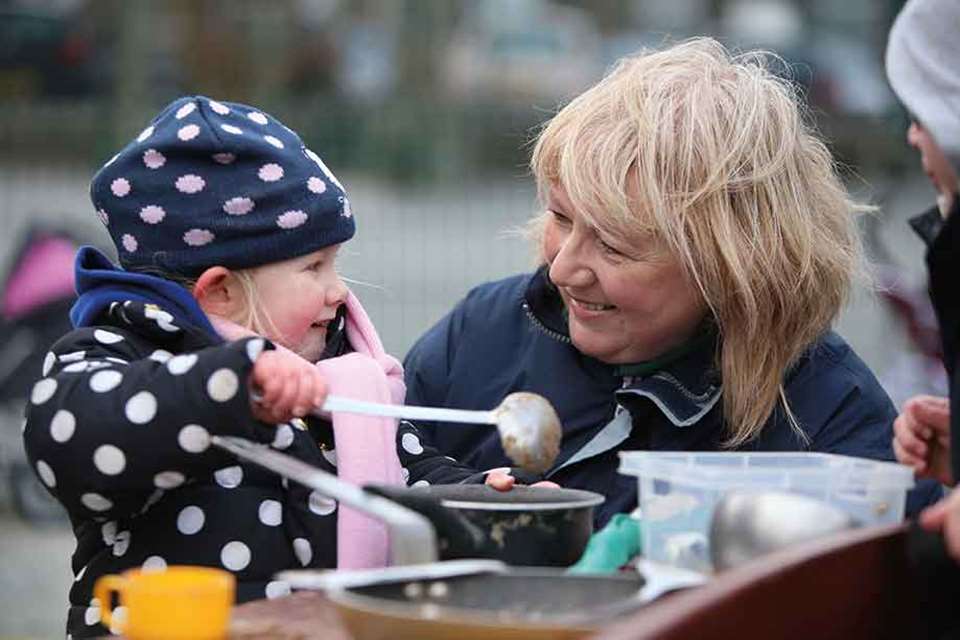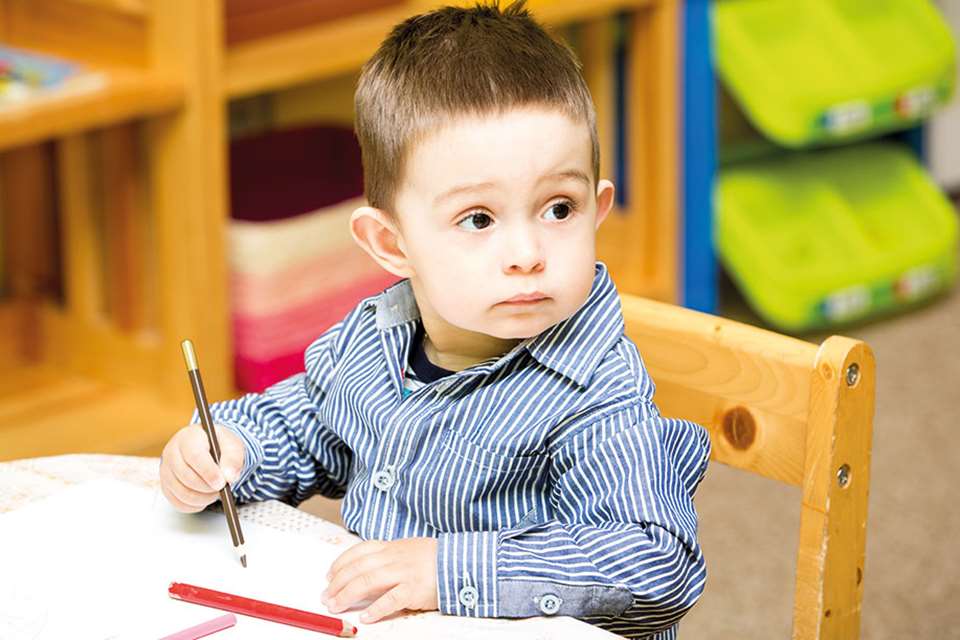EYFS best practice in schools - In the balance
Ruth Thomson
Monday, March 19, 2018
The recent ‘Bold Beginnings’ report by Ofsted has only added to the uncertainty about what is expected of children in their first year of school. Charlotte Goddard investigates

Reception has always occupied an uncertain space. The pedagogy and curriculum sit firmly within the Early Years Foundation Stage, but Reception classes are located within a school, which will have its own ethos and expectations.
‘Reception has never been properly understood,’ says Jan Dubiel, head of national and international development at consultancy and trainer Early Excellence. ‘In most countries, children start in Year 1 or 2, but for historical and economic reasons, in this country we have a school year when children are still in early childhood.’
 CURRICULUM CONFUSION
CURRICULUM CONFUSION
Ofsted’s recently published ‘Bold Beginnings’ report looks at the Reception curriculum in successful schools, and how well it prepares children for the rest of their education and beyond. The authors state that ‘around two-thirds of the staff inspectors spoke to confused what they were teaching (the curriculum) with how they thought they were supposed to teach it’.
Teachers, heads and experts agree there is confusion, but many feel this arises from mixed messages coming from the Government and Ofsted itself, given that the EYFS provides clear information about what a child needs to learn.
‘Some of the early learning goals are not ideal, but they are pretty clear,’ says Kym Scott, early years trainer and consultant. ‘The problem is some expectations can creep through from senior leaders, who are not always experts in how the youngest children in school learn. The stakes are very high, as so much is judged on outcomes, and if heads don’t have a specialised understanding of how young children learn, they are more likely to drive staff down a more formal route.’
Ofsted itself backs up the idea that pressure from higher up the school is affecting the Reception curriculum, although this is presented as a positive feature of successful schools. ‘Bold Beginnings’ says leaders in the featured schools were designing their own Reception curriculum, because they felt the early learning goals were insufficient preparation for a child’s education in Year 1 and beyond. The fact that the EYFS outcomes do not link with National Curriculum expectations in Year 1 and beyond makes it difficult for schools to manage the transition.
FOUNDATION FOR LEARNING

However, there are concerns that redesigning the Reception curriculum to meet expectations further up the school can lead to the introduction of watered-down versions of approaches that are more suitable for older children, rather than a curriculum designed around the learning needs of very young children.
The EYFS is designed to develop skills that make children effective learners, and the fear is they are now expected to gain knowledge and skills without having this essential foundation in place.
‘The idea of doing more earlier is the fatal flaw,’ says Elaine Bennett, EYFS and Year 1 leader at Friars Priory School and Nursery in Shoeburyness. ‘The Prime areas and Characteristics of Effective Learning are being increasingly put on the back shelf in favour of structured literacy and numeracy, but if children haven’t got the Prime areas of learning secured, they are not going to succeed in the more abstract areas of learning,’ she adds.
‘In my school I have the full backing of my senior leadership team; around the country many other Reception and nursery teachers are not so lucky. These are the teachers who are having to fight their corner each and every day to ensure that their children’s needs stay at the heart of their practice.’
Lynn Knapp, head teacher at Outstanding-rated Windmill Primary School in Oxford (pictured below), agrees. ‘At the moment the emphasis is too much on literacy and numeracy, and the Characteristics of Effective Learning could be lost,’ she says. ‘I love that the Reception curriculum is so broad, with aspects of physical development, creativity, emotional literacy – those underpin children’s capacity to access the rest of the curriculum. We would like to keep the learning characteristics in Reception or some children will be set up to fail later.

‘We are all under pressure, but Reception should be about equipping children with skills that they need for learning, and we risk children being taken through that too quickly. At our school we have elements of phonics and maths every day in Reception, but we have a very play-based curriculum.’
Reception teachers are hampered by a lack of guidance, says Sue Robb, head of early years at Action for Children. ‘I think there should be a specific section in the EYFS framework on Reception, because it seems to have lost its way. The DfE is looking at revising the early learning goals, and that is an opportunity to revisit Reception and offer some guidance.’
Not everyone is convinced that Government guidance would be helpful, however. ‘It’s great to see the Reception year in the spotlight, the early learning goals for maths and English need looking at, but the danger is that the DfE will not engage with experts or look at the existing international research,’ says Mrs Bennett. ‘It could easily end up going the wrong way by pushing the goals up and making them harder in a bid to align them with a flawed Year 1 National Curriculum.’
EARLY LITERACY
‘Bold Beginnings’ states that teachers at effective schools place literacy and language at the heart of the Reception curriculum. ‘It is not true to say reading is the core purpose of the Reception year,’ says Ms Bennett. ‘It is one of the core purposes but not the only one. For some children the core purpose will be physical development or language development, for others it will be social and emotional development.’
‘Bold Beginnings’ advocates a formal approach when it comes to literacy, saying that in successful schools writing takes place using pencils and exercise books while children sit at tables. ‘I am not concerned about literacy featuring heavily in Reception year, but I am concerned about what it looks like,’ says Ms Scott. ‘Some phonics schemes recommend that four-year-olds are sat down for 50 minutes a day, filling in workbooks. Giving children agency over what they write is what makes the biggest difference, in my experience.’
In fact, says Ms Scott, some schools, especially those following certain literacy schemes, are actively discouraging Reception children from self-directed writing. ‘Some of the statements in the judgement record, which Ofsted released at the same time as “Bold Beginnings”, are out of kilter with how we know young children learn,’ she says. ‘For example, children are not expected to write independently unless they are already able to write one representative of every grapheme. That is flying in the face of years of research on emergent writing and children writing for play.’
As an example of child-led good practice, she describes a situation where a teacher asked children playing at running a beauty salon to write down details of her ‘appointment’. ‘It was absolutely direct teaching in a play situation,’ says Ms Scott. ‘She extended the learning by encouraging the children to make appointment cards and later suggested they market their salon through leaflets. She taught them that writing can make play better, rather than ruining it by dragging them away to come and sit at a phonics workbook.’
In Ms Bennett’s experience, Reception teaching is becoming dominated by phonics. ‘Nobody is saying phonics are not important, but reading and writing are so more than just phonics – that is just an element of helping children learn to read and write,’ she says. ‘When children read using phonics alone, the danger is you lose the love of reading, as what you can give them to read is very limited. Literacy in Reception should include lots of stories, reading, rhymes, talking, puppets and creative expression.’
A BALANCED PEDAGOGY
‘Bold Beginnings’ is being used by some senior leaders and local authorities to change what is happening in Reception classes. ‘Many Reception teachers are now being told to extend phonics from 20 to 45 minutes a day, and have children doing more table work, so they have a morning that comprises literacy and numeracy activities and everything else has to take place in the afternoon,’ says Ms Bennett. ‘That means less time to be physically active, choose their own learning and less time to play.’
Many in early years point out that they are not against the idea of direct, adult-led teaching, but instead see this as one approach among many. ‘We are not against children learning all of these skills, rather we are focused on how they learn them and the time given to apply them in different ways,’ says Ms Scott.
‘Every day there will be times when children have some phonics or maths input, but it has to be short and relevant, and then we are looking at how the children can use or develop further what they have learned, through interaction and the environment,’ says Ms Bennett.
Not all schools feel that pressure to teach in a particular way in Reception is coming from Ofsted. Windmill Primary School was last inspected in 2015. ‘We didn’t feel any expectation that children should be taught in any particular way, it was about learning effectively,’ says Ms Knapp. ‘Inspectors liked the fact there were lots of opportunities to problem-solve, and being challenged through play.’
ASSESSMENT
Confusion about what to teach in Reception has also arisen from a misunderstanding of Development Matters, the non-statutory guidance issued to support delivery of the EYFS. ‘Development Matters was set up as a framework to support people’s knowledge and understanding of how children develop,’ says Mr Dubiel. ‘Problems arise when people start using it as a tick-list for what children should be achieving. Most assessment systems, although not the Early Excellence system, use Development Matters as assessment criteria, and it is not designed for that.’
Ms Robb also feels the Reception curriculum is being led by assessment rather than by a learning and development framework. ‘Reception teachers can tell me about early learning goals but not about the programme of study,’ she says.
The introduction of Baseline assessment in Reception adds another layer of testing, and could lead to an increase in grouping children by ability at a very early age, believes Ms Scott. ‘There are phonics schemes that recommend you group by ability,’ she says. ‘Baseline assessment is not going to help with that, if children are grouped according to how they perform in the Baseline. What does that do for social mobility and aspirations if children are not mixing with their peers but always with the same group – and they quickly work out which group they are in?’
IMPACT OF CUTS
As well as mixed messages from Government and Ofsted, cuts are impacting practice. ‘Funding impacts the learning environment that a school is able to provide,’ says Ms Bennett. ‘It also affects staffing: some schools have made support staff redundant.’
Support staff make all the difference when it comes to delivering the kind of balanced, child-led curriculum the EYFS demands. ‘We know what works for children, but it is a challenge to deliver with one adult and 30 children,’ says Mr Dubiel. ‘Heads and senior leaders need to understand the nature of Reception pedagogy, then they are more likely to be more sympathetic to ratios in Reception.’
At Windmill Primary, leaders prioritise early years staffing. ‘Our governing body does not want to cut back on ratios, and TA [teaching assistant] coverage has been maintained,’ says Ms Knapp. ‘In Reception, we employ nursery nurses rather than TAs, and children with additional support needs will also have an additional adult in the room.’
Reception staff themselves are not always fully up to speed with early years pedagogy. ‘There is confusion even among experienced Reception teachers, as well as those who might be teaching Reception but mostly have experience with KS1 or 2, around what good practice looks like and what we mean by terms such as child-led, adult-led and play,’ says Mr Dubiel. ‘There is a whole lexicon of terms very specific to early years, and the terminology needs to be clarified.’
TRAINING
One major factor in poor Reception practice is the fact that both initial teacher training and continuing professional development contain very little about child development. ‘We need a change in the way early years teachers are trained, as well as CPD covering early brain development, child development and pedagogy,’ says Catriona Nason, chief executive of early years training body NEyTCO.
‘Anyone working in a Reception class should be trained in child development. There are routes into teaching which are sadly lacking early child development training and this should be addressed.’
Ms Robb agrees. ‘We need to talk more about pedagogy in teacher training,’ she says. ‘Although there is magical practice going on, I also see a lot of really poor practice: either completely unstructured classes, or classes that are too formal. In both cases, this lacks that good practice of dropping in snippets of high-quality teaching before children go off and refresh skills they have learnt through their play.’
Another issue is that primary heads rarely come from an early years background. ‘There is not a clear career path from the early years classroom to headship,’ says Viv Trask-Hall, senior development manager at training organisation Thrive. ‘We need to look at how we wrap CPD around the people we have got to help them develop their expertise, and for that career path to be recognised more widely.’
CPD covering the needs of early years children should be accessed not just by early years staff but by the whole school, says Mr Dubiel.
The recent focus on Reception is an opportunity for early years practitioners to really make the case for a curriculum and pedagogy designed around how very young children learn. ‘The current spotlight on Reception and its specificity and otherness is good,’ concludes Mr Dubiel. ‘It could help to develop a consensus about what should be taught, why, and how.’
DEVELOPING WELL

When Tamara Gulliver became head of The Mill Academy in Barnsley in 2013, it was in special measures. The school’s most recent Ofsted inspection in 2017 saw it rated Good overall and Outstanding in early years. Training staff throughout the school in child development was a major driver to improvement, says Ms Gulliver.
Although the school was in special measures, Ofsted described behaviour as ‘good’, but this behaviour did not translate to good academic achievement. ‘Pupils appeared to be well-behaved, but in fact they were quiet, disengaged and didn’t believe in learning,’ she says. ‘Many had a built-in fear that they were only going to fail in school and, therefore, it was best to stay silent, struggle on and do the bare minimum to get by.’
The school has now trained staff in the Thrive Approach, which aims to help practitioners understand how children develop socially and emotionally from birth through to adulthood, clarifying what the role of adults should be in facilitating a child’s development at each of the different stages.
‘Social and emotional development is not taught in a clear enough way in initial teacher training,’ says Paula Holbrook, chief operating officer at Thrive. Thrive is working with Sheffield Hallam University, teaching the Thrive approach to Early Years Initial Teacher Training (EYITT) students. ‘I am interested in finding out how we can help other ITT establishments deliver social and emotional learning,’ says Ms Holbrook. ‘It is something that should be added to continuous professional development.’
MORE INFORMATION
‘Ofsted’s Gill Jones begins drive to clarify Bold Beginnings report’ – for this and other news stories about ‘Bold Beginnings’, visit: www.nurseryworld.co.uk
For more on Reception practice, see EYFS Best Practice in Schools – ‘Being bold’, at:www.nurseryworld.co.uk










